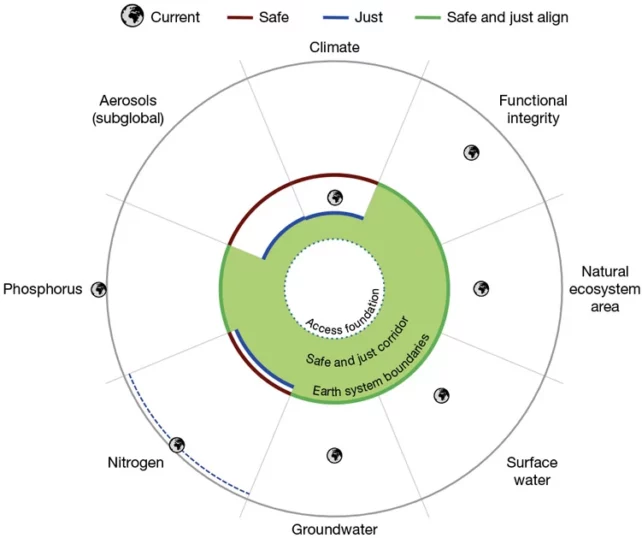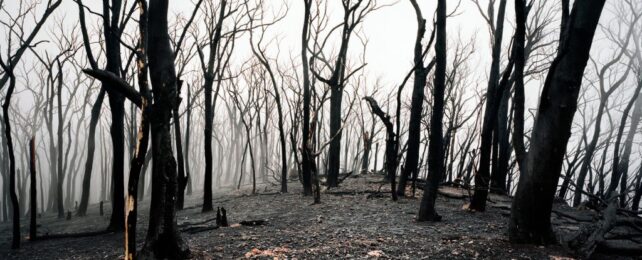Humanity's consumption comes at a cost to a wide variety of planetary systems that depend on one another for sustainability. Like dominoes, instability in one leans heavily on others in line, creating a set of boundaries that can cause serious problems if breached.
Past studies have warned our appetites have stressed at least a few of these boundaries to breaking point. Yet as handy as it is to interpret our global ecology in such a way, it fails to consider the accessibility we may have – and often don't have – to necessary resources.
According to a new report by a large international team of researchers, when fairness and justice is taken into account for each field, major components of our planet's life-support systems fail not for just a couple of boundaries, but on at least seven out of eight counts.
Thanks to us, the climate, the biosphere, the water cycle, the atmosphere, and the nutrient cycle on Earth have all been thrown dangerously out of whack already for much of the world's population.
Yet when justice is taken into account, some scenarios begin to affect portions of our planet far sooner, posing far more stringent boundaries. Aerosols, for example, put the health of millions around the world at risk, with "with vulnerable groups being affected disproportionately more while polluting less."
The idea of 'safe planetary boundaries' was explored in 2009 by some of the same researchers as those behind this latest analysis, including climate scientist Johan Rockström of the Potsdam Institute for Climate Impact Research.
Back then, Rockström and his colleagues only considered what 'safe' biophysical boundaries Earth had crossed. Adding a threshold of justice, this new approach factors in human access to water, food, energy, health, and a clean environment.
Needless to say, it's far from an improved picture. The updated report is rather distressing, and that's putting it lightly.
"Science is showing clearly that we are at risk of destabilizing the entire planet," Rockström told the ABC.

And yet still, the world continues to burn fossil fuels, manufacture synthetic chemicals, deforest land, extract groundwater, destroy rivers, and pollute the environment with fertilizers, plastics, forever chemicals, radioactive waste, heavy metals, and antibiotics.
All of that needs to change, scientists say, and climate action should be a top priority.
To keep within 'safe' and 'just' boundaries for all, Rockström and his colleagues argue that global warming should be limited to 1 °C above pre-industrial levels.
That's well below current climate goals and far below our projected reality of about a 1.2 °C global average for 2023. Above 1.5 °C or 2.0 °C warming, researchers say "the likelihood of triggering tipping points increases to high or very high, respectively".
At this point, biosphere damage and the risk of triggering further climate feedback loops increases substantially. And the most vulnerable, poor, and marginalized humans will be put at risk first.
At 1.5 °C (the current aim of the Paris Climate Agreement), an estimated 200 million people could experience extreme temperatures and 500 million could be exposed to long-term sea-level rise.
"These numbers of people harmed vastly exceed the widely accepted 'leave no one behind' principle and undermine most of the Sustainable Development Goals," researchers of the report write, referring to a mission set by the United Nations.
Phosphorous and nitrogen are two other safe boundaries that stand out in the current report. These nutrients are leached into the environment via agriculture, and they can cause blooms of plant and algae life that can harm animals, causing fishery collapse or polluting drinking water.
Earlier this year, some scientists warned we were headed for 'phosphogeddon' through our misuse of phosphorous, which is used for crop growth but which is being depleted at an alarming rate globally.
The number of crises that humans are facing all at once is overwhelming. In just the last month these include a food crisis across the Horn of Africa, heat deaths in India, catastrophic floods in Italy, a deadly cyclone in Myanmar, massive wildfires in Canada and plenty more. These are all connected to the consequences of our planetary boundary pushing and ignoring them won't make them go away or stop happening.
Hundreds of millions of humans are at imminent risk, and parts of our planet may never be the same again.
"Nothing less than a just global transformation across all [Earth's safe boundaries] is required to ensure human well-being," the report concludes.
"All evidence suggests this will not be a linear journey; it requires a leap in our understanding of how justice, economics, technology and global cooperation can be furthered in the service of a safe and just future."
The study was published in Nature.
